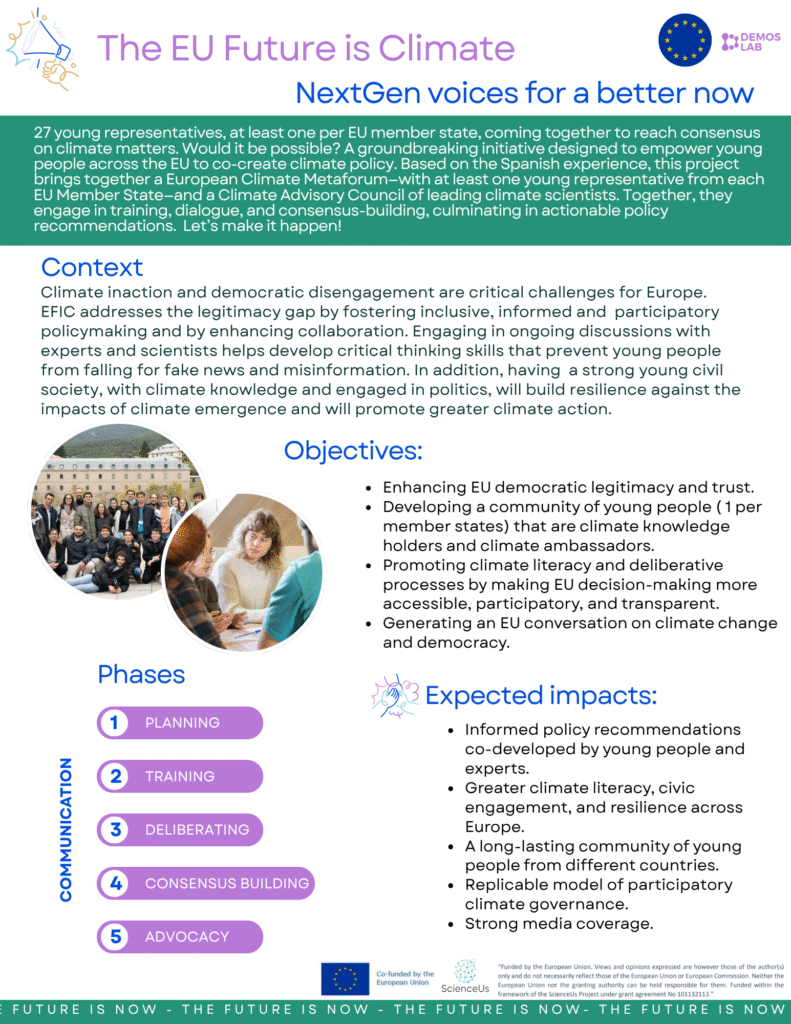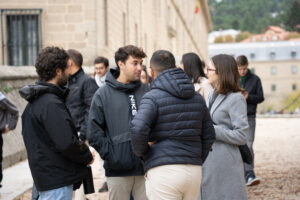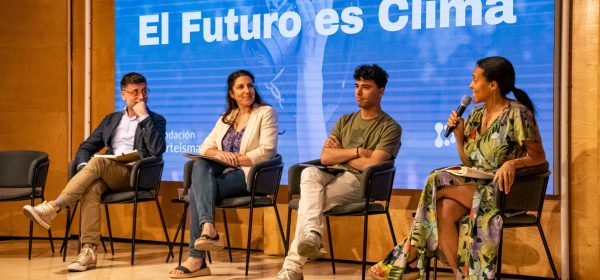
Climate inaction and democratic disengagement are critical challenges for the present and future of the EU – and for the whole world. In this political arena one truth has emerged: climate adaptation requires strong democratic engagement. It’s not enough to have experts writing down solutions on paper, we need as much voices as possible and an informed, empowered, and participatory society to bring them to life. This is where The Future is Climate (FIC) started.
EU Young voices for a stronger climate action: The EU Future is Climate
The Future is Climate initiative
The Future is Climate is a citizen science and representative deliberative process formed by two deliberative bodies working together: the Climate Metaforum (40 randomly selected young people from all over Spain) and the Climate Advisory Council (20 climate scientists and experts). The aim is to foster sustained engagement from young people on climate action by creating participation mechanisms and to close the gap between scientists and young people by establishing ongoing dialogues. Participants receive expert training, collect data from their own communities on obstacles to climate action, and engage in consensus-building sessions to generate recommendations for policymakers.
Unlike traditional citizen science projects rooted in the natural sciences, FIC is a citizen science project in the realm of social and political science and participatory research. Young people in our Metaforum are active co-researchers that in order to engage in the discussions need to gather data, rely on the Climate Advisor Council and reach informed decisions. Therefore, our Metaforum co-produces knowledge about climate preferences and solutions that advances political science and social studies.
Specific focus on youth engagement
The climate crisis will affect younger generations longer, yet their involvement in shaping climate adaptation strategies remains limited. The Future is Climate creates a structured space for young people to meaningfully engage with climate policy, not as passive recipients of decisions but as co-creators of solutions.
At its core, the project recognizes that building climate resilience is not only a technical challenge but a democratic one. It requires participatory governance, trust in institutions, and the recognition of young people as both stakeholders and knowledge holders.

From Spain to the EU: Scaling Collective Intelligence
Following its success in Spain, the project is now looking to scale up to the European level. The proposed EU Future is Climate will consist in the development of two bodies: the EU Climate Metaforum formed by of one young representative from each EU member state, supported by a EU Climate Advisory Council made up of leading climate experts.
The objectives are:
- Enhancing EU democratic legitimacy and trust.
- Developing a community of young people ( 1 per member states) that are climate knowledge holders and climate ambassadors.
- Promoting climate literacy and deliberative processes by making EU decision-making more accessible, participatory, and transparent.
- Generating an EU conversation on climate change and democracy.
This is more than an educational and symbolic exercise; it’s a blueprint for resilient, democratic climate governance across the European union.
The EU Future is Climate: expected impact
One of the most powerful outcomes of FIC is the transformation of its participants. Trained in climate science and critical thinking, these young citizens emerge not only as informed advocates for climate action but as champions of democratic dialogue. We aim to have the same impact at the EU level and to create a long-lasting community of young people from different countries.
By engaging with scientists, public institutions, and communities, young representatives will contribute to restoring trust in both science and democratic institutions. The project aims to shift the narrative: young people are leaders, researchers, and agents of change.
Climate adaptation is not just about infrastructure and environmental policy; it’s about people. It’s about creating spaces where young citizens can learn, deliberate, and lead. It’s about understanding that democracy isn’t a given. You have to create it, nurture it, care for it. In a time when polarization, misinformation and disinformation profoundly challenge social cohesion we aim to offer a hopeful, collective and practical pathway forward.

“Funded by the European Union. Views and opinions expressed are however those of the author(s) only and do not necessarily reflect those of the European Union or European Research Executive Agency. Neither the European Union nor the granting authority can be held responsible for them.”


